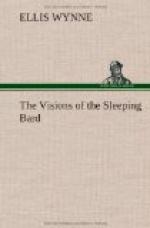—Shakespere: Lucrece, 124.
{4a} Such a fantastic rout.—Literally “such a battle of Camlan.” This was the battle fought between Arthur and his nephew Medrod about the year 540 on the banks of the Camel between Cornwall and Somerset, where Arthur received the wounds of which he died. The combatants being relatives and former friends, it was characterised with unwonted ferocity, and has consequently come to be used proverbially for any fray or scene of more than usual tumult and confusion.
So all day long the noise of battle roll’d
Among the mountains by the winter sea,
Until King Arthur’s table, man by man,
Had fallen in Lyonness about their Lord.
—Tennyson: Morte d’Arthur.
{4b} To lampoon my king.—The Bard commenced this Vision in the reign of William iii. (v. also p. 17, “to drink the King’s health”) and completed it in that of Queen Anne, who is mentioned towards the end of the Vision.
{7a} The Turk and old Lewis of France.—The Sultan Mustapha and Lewis XIV. are thus referred to.
{14a} Clippers.—The context seems to demand this meaning, that is, “those who debase coin of the realm,” rather than “beggars” from the Welsh “clipan.”
{20a} Backgammon and dice.—These games, together with chess, were greatly in vogue in mediaeval Wales, and are frequently alluded to in the Mabinogion and other early works. The four minor games or feats (gogampau) among the Welsh were playing the harp, chess, backgammon, and dice. The word “ffristial a disiau” are here rendered by the one word “dice”—ffristial meaning either the dice-box, or the game itself, and disiau, the dice.
{21a} This wailing is for pay.—Cp.
Ut qui conducti plorant in funere dicunt
et faciunt prope plora dolentibus ex animo.
—Horace: Ars Poetica, 430-1.
{23a} The butt of everybody.—Whenever a number of bards, in the course of their peregrinations from one patron’s hall to another, met of a night, their invariable custom was to appoint one of the company to be the butt of their wit, and he was expected to give ready answer in verse and parry the attacks of his brethren. It is said of Dafydd ap Gwilym that he satirized one unfortunate butt of a bard so fiercely that he fell dead at his feet.
{24a} Congregation of mutes.—At the time Ellis Wynne wrote, the Quakers were very numerous in Merioneth and Montgomery and especially in his own immediate neighbourhood, where they probably had a burying-ground and conventicle. They naturally became the objects of cruel persecution at the hands of the dominant church as well as of the state; their meetings were broken up, their members imprisoned and maltreated, until at last they were forced to leave their fatherland and seek freedom of worship across the Atlantic
{25a} Speak no ill.—A Welsh proverb; v. Myv. Arch. III. 182.
{26a} We came to a barn.—The beginning of Nonconformity in Wales. In the Author’s time there were already many adherents to the various dissenting bodies in North Wales. Walter Cradoc, Morgan Llwyd and others had been preaching the Gospel many years previously throughout the length and breadth of Gwynedd; and it was their followers that now fell under the Bard’s lash.




